- Home
- Parnell Hall
The Purloined Puzzle
The Purloined Puzzle Read online
Begin Reading
Table of Contents
About the Author
Copyright Page
Thank you for buying this
St. Martin’s Press ebook.
To receive special offers, bonus content,
and info on new releases and other great reads,
sign up for our newsletters.
Or visit us online at
us.macmillan.com/newslettersignup
For email updates on the author, click here.
The author and publisher have provided this e-book to you for your personal use only. You may not make this e-book publicly available in any way. Copyright infringement is against the law. If you believe the copy of this e-book you are reading infringes on the author’s copyright, please notify the publisher at: us.macmillanusa.com/piracy.
For Edgar,
who started it all
Those Who’ve Clued Poe
I would like to thank my merry band of mischief makers, without whom this book would not have been possible. I’d be willing to wager each and every one of them has used Poe in a crossword at one time or another.
Will Shortz, New York Times crossword puzzle editor, constructed the Sudoku used in this book. Even though it is all numbers, I would not be surprised to find the word Poe hidden there somewhere.
Fred Piscop constructed the crosswords, almost before I asked for them. Soon he’ll be constructing them before I even write the book.
Ellen Ripstein, the American Crossword Tournament champion, edited the puzzles and saved me, once again, from my mistakes.
The Puzzle Lady thanks them.
Chapter
1
“I have a puzzle for you.”
Cora Felton winced. She regarded the eager girl looking up at her much in the way a person might regard a particularly irritating gnat. She took a breath and forced a rather frosty smile. “No, you don’t.”
“Yes, I do. I have a crossword puzzle for you.”
“You may have a crossword puzzle, but it’s not for me. It’s for you. And you should work at it until you solve it.”
“But you’re the Puzzle Lady.”
Cora Felton grimaced. She was the Puzzle Lady, much to her chagrin. She had a nationally syndicated crossword puzzle column and a series of TV ads hawking a breakfast cereal to schoolchildren. In both cases she was a total fraud. She didn’t eat the cereal and she couldn’t do the puzzles. Her niece Sherry was the brains of the outfit. Sherry created the puzzles and wrote the column and sent it off to syndication. All that Cora contributed was the smiling, grandmotherly face that graced the column.
Because of this, Cora was constantly being ambushed by people who wanted her to talk about crossword puzzles or, worse, solve crossword puzzles, which she had about as much chance of doing as she had of swimming the English Channel.
Today she had just stopped into Cushman’s Bake Shop for a cranberry scone, of which she was particularly fond. Mrs. Cushman couldn’t bake a lick and trucked in all her pastries from the Silver Moon Bakery in Manhattan, so her wares were top-notch and demand was high. Cora was waiting at the counter, and the last thing she needed was to be distracted by a fan and lose her place in line.
Over the years Cora had become quite adept at sidestepping annoying people who wanted to pester her about puzzles. But this was a young girl. Of that she was quite certain. Cora had reached the age where girls she thought were teenagers often turned out to be twenty-eight or even thirty-five, but she would have made book on the fact the bright-eyed, fresh-faced young thing in the ponytail and retainer was under twenty. This was definitely a schoolgirl, and disappointing children was a serious matter. There was even a clause in her contract with Granville Grains Cereal that triggered a termination-without-compensation option in that instance.
“And who might you be, young lady?”
“Peggy Dawson.” From the girl’s somewhat pained inflection, Cora had probably met her before, though she had no recollection of it.
“Well, listen, Peggy Dawson. I’ll tell you what I’ll do. Give me your puzzle and I’ll take it home, and when I get some time I’ll look at it. I’m not promising anything, you understand. I get so many crosswords. I can’t solve them all.”
Cora had been particularly pleased when she came up with that excuse. It was absolutely true. She couldn’t solve them all. In point of fact, she couldn’t solve a single one, but that minor detail got lost in the shuffle.
Peggy Dawson’s face left no doubt as to her youth. “But I need it solved,” she said. She looked like she might stamp her foot. “Or I won’t know what it says.”
“That is absolutely true,” Cora said. “If you don’t solve it, you won’t know what it says.”
Cora had reached the front of the line.
Mrs. Cushman smiled at her. “And what will it be today?”
“A cranberry scone. Please tell me you’re not out of them.”
“You’re just in time. I’ve got two left.”
Cora was tempted to buy both of them and save one for later, but that wouldn’t help her fit into her new dress, which she had bought a trifle on the small side as an incentive to lose weight. Her closet was full of clothes she had bought on that basis.
“I’ll have a latte and a scone,” Cora said.
“One latte,” Mrs. Cushman called to her helper. She rang Cora up, gave her the scone, and made change.
Cora moved down the counter and picked up her latte. She took a greedy bite of the scone and turned away from the counter to find the girl still standing there. Somehow Cora had expected her to be gone.
“That won’t do at all.” Peggy picked up the conversation as if there had been no interruption. “I’m really worried about this puzzle, and I’ve got to know what it means. Won’t you help me? It’s a mystery. I thought you liked mysteries.”
“How is it a mystery?”
“I don’t know who sent it, and I don’t know why. Look, my truck’s right outside. Let’s take a run out to my house and I can give you the puzzle and we can clean all this up.”
Cora was astonished at how the girl had steamrolled over all her objections by simply ignoring them. It seemed like the only way to get rid of the girl would be to take out a gun and shoot her. It occurred to her Granville Grains probably had a clause in her contract about that.
Harvey Beerbaum banged in the door. He waved at Cora and took his place in line. Her answering wave was less enthusiastic. The pudgy gentleman in the tweedy suit and tie was a terrible bore, constantly pestering her with his attentions. Cora was never sure whether he was hitting on her or if he was actually gay.
Worse, the man was a genuine cruciverbalist, who constructed puzzles for The New York Times and could never understand why she was not just dying to talk about them.
If the truth be known, Harvey Beerbaum was even more annoying than the maddening girl.
Cora’s eyes widened.
She glanced from one to the other and practically purred.
Cora put on her most coy and coquettish face, batted her eyes, and managed a singsong lilt to her voice.
“Har-vey.”
Chapter
2
“Are you sure you’re old enough to drive?” Harvey Beerbaum said. Harvey hadn’t been happy when Cora sent him along in her place. He was even less so when he found out it meant Peggy would be driving.
Harvey was jouncing along on the passenger seat of Peggy’s pickup truck. The dirt road up which she lived had a number of ruts and potholes, which the girl seemed to be ignoring and driving right through.
“I’m sixteen,” Peggy said.
That did not cheer him. While she was indeed old enough to drive, it occurred to Harvey that at least
they weren’t crossing any state lines. He found the fact he’d even had that thought unsettling.
Without any warning, Peggy swerved to the left up a dirt road even bumpier than the one they had just left. It wound around and stopped by an old farmhouse on the side of the hill. A rocky overgrown meadow stretched out in front of it. Had a farmer ever plowed the field, he would have experienced a tractor ride even worse than the journey Harvey had just enjoyed in the truck.
“Here we are,” Peggy announced cheerfully. She had the door open and was out of the truck before he had even righted himself.
Harvey slid down from the passenger seat. The ground seemed farther than he’d anticipated. He caught his balance, straightened his jacket and tie.
“Come on, let’s get the puzzle,” Peggy said, hopping up on the porch.
“Why don’t you bring it out?”
“Oh, don’t be an old stick-in-the-mud.”
“Is anyone at home?”
“Johnny’s here. That’s his car.”
“Johnny?”
“My brother.”
As if on cue, a young man came out the front door. At least young by Harvey’s standards. He was certainly older than the girl. Late twenties, perhaps. Rugged type. He wore a jacket and tie, and looked somewhat uncomfortable in it, as if he’d be more natural in sweatpants and a T-shirt. He took one look at Harvey and demanded, “Who’s he?”
Harvey was somewhat taken aback, but he forced a smile. “I’m Harvey Beerbaum.”
The young man scowled at his sister. “Come on, Peggy, we talked about this. You can’t bring men around when I’m not here.”
“You’re here.”
“I’m going out.”
“And that’s my fault?”
“He can’t be here. No offense,” Johnny said. “My sister’s young, she doesn’t know what’s appropriate.”
“I’m not young.”
“See?” Johnny smiled, which softened the rudeness. Harvey figured he could probably get away with a lot with that smile.
“She just wanted help with the crossword puzzle,” Harvey said.
“The what?”
“I’m good with crossword puzzles.”
“You can’t go in the house. She doesn’t understand, but I’m sure you do.”
“I’m not going in the house. We just came to get the puzzle.”
“Where’s the puzzle?”
“In my room,” Peggy said impatiently. “Where did you think it was?”
“Well, he’s not going up there. You get the puzzle and bring it down.”
“Fine,” Peggy said. Her attitude indicated it wasn’t fine, but her brother was a moron and there was no use arguing.
“I gotta go,” Johnny said. He pointed at Harvey. “I’m counting on you to do the right thing.”
Harvey nearly said, “Yes, sir.”
Johnny got in his car and drove away.
Peggy clapped her hands together. “Great. Come on.”
“What?” Harvey said.
“Let’s go get the puzzle.”
“Your brother doesn’t want me in the house.”
“He’s gone.”
“I’m not going in the house.”
“Oh, come on.”
“You heard what your brother said. Get the puzzle and bring it down.”
“Fine.”
Peggy stomped off into the house.
She was back in minutes. “It’s gone!”
“What?”
“The puzzle. Someone took it.”
“Oh, for goodness’ sakes. Why would anyone take a puzzle?”
“I don’t know, but someone did. It was right on my desk. Now it’s not.”
“Are you sure?”
“Sure I’m sure. It was right there in plain sight.”
“Who else is here?”
“No one. No one’s here.”
“Isn’t it possible you put it away and forgot you moved it?”
“No, it’s not possible. If I moved it, I’d know I moved it. And I didn’t move it. It was right on the desk and it’s gone. I’ll show you.”
“Show me what?”
“The desk. Where it was taken.”
“If it’s gone, there’s nothing to see. And your brother doesn’t want me in the house.”
“That was before someone stole my puzzle. You think he wants people coming in stealing things? That’s why he doesn’t want me bringing people by.”
Harvey thought that wasn’t even remotely why Peggy’s brother didn’t want her bringing people by, but he wasn’t about to argue.
He wasn’t about to go in the house, either.
“My dear young lady. This is not what I signed on for. It is frankly out of my field of expertise. Cora Felton asked me to help you with a puzzle. The fact that the puzzle is missing throws the ball back in her court.”
“But she doesn’t want the ball,” Peggy complained, in the peevish voice seemingly trademarked by disappointed teenagers.
“Failing that, young lady, there is an excellent course open to you.”
Peggy scrunched up her nose. “Do you enjoy confusing people?”
“I’m sorry. That was not my intention. If you really believe the puzzle has been stolen, there is only one thing to do.”
“What’s that?”
“Go to the police.”
Chapter
3
Cora came out the front door of Cushman’s Bake Shop and nearly dropped her latte. She stood on the sidewalk, blinking. Surely it was the bright morning sun that was distorting her vision, making her think she had seen things that she hadn’t. The man getting out of the car across Main Street in front of the library couldn’t be whom she thought.
His hair was way too dark for a man his age, screamed of dye, or hair plugs, or even a wig. And his suit was shiny. The sun reflected off it in a blinding glare.
He turned, and the light fell on his face.
“Melvin!” Cora gasped.
Cora’s least favorite ex-husband saw her and smiled, the same ingratiating grin that had caused women who should have known better to lose their minds, to think this subhuman specimen of masculinity was not only acceptable but damn near irresistible. Cora had married him once. Granted it was back in the days when she was drinking, but that was no excuse. The man held a strange fascination.
“Hi, Cora,” Melvin called. He crossed his legs, leaned back against the side of his car, making her come to him, just like in the old days. She was tempted to walk away and leave him hanging.
Instead, she took a bite of scone, washed it down with sip of coffee, and stepped off the curb.
A car nearly ran her down. The driver hit the horn. Cora saw to her embarrassment it was First Selectman Iris Cooper. That was sure to be the talk of the next bridge game.
Cora looked both ways, continued to cross the street.
“Melvin, what are you doing here?”
Melvin grinned. “I don’t see why you’re so surprised. It’s not like you haven’t seen me lately.”
“I’ve seen you in New York. I haven’t seen you in Bakerhaven.”
“It’s awhile since I’ve been back. But you know, I miss this place.”
“No, I don’t know that, Melvin. Tell me how you miss this place enough to come driving up.”
“Could I have some of that scone?”
Cora jerked her thumb over her shoulder. “Cushman’s Bake Shop. If you hurry, they have one left.”
“Just helping you maintain your trim figure.”
“That’s not going to get you anywhere, Melvin.”
“Is it going to get me a scone?”
Cora broke off a piece, handed it to him. “Here, if it will shut you up. What are you doing here?”
“Would you believe I came to see you?”
“No.”
“Well, that’s honest enough. All right, I’m scouting some real estate.”
“No, Melvin, you’re not.”
“Why not?”
/> “Because that’s a legitimate enterprise. If you’re involved in something, it must be nefarious.”
“Oh, big word. You must do crosswords, or something.”
Cora flinched. Melvin was one of the people who knew she was a fraud. He was also unscrupulous enough to reveal it.
“I know you, Melvin. You’re changing the subject like you had something to hide.”
Melvin grinned. “She said, changing the subject.”
“You’re the subject, Melvin. I have a right to be in Bakerhaven. You, on the other hand, can’t justify your existence.”
“You mean my presence. That’s pretty sloppy for a wordsmith.”
“I mean existence. You can’t justify your presence either, but that’s a lesser issue. You wanna walk me through the real estate bit?”
“I thought you didn’t believe the real estate bit.”
“I don’t, but I’ll humor you.”
“I’m scamming the real estate market.”
“Why?”
“Ah. Manhattan prices are through the roof. People are leaving town. The suburbs are filling up, so people are moving farther out and commuting longer distances. Bakerhaven is the new Scarsdale.”
“Tell me you didn’t say that.”
“Anyway, the real estate market’s a gold mine.”
“But you’re not a real estate broker.”
“No, but Judy Douglas Knauer is. I can lay ten percent on top of her price and the sucker thinks he’s getting a deal.”
“That sounds more like you, Melvin.”
“Thank you. I hope you didn’t think I’d gone legit.”
“You’re really up here flimflamming the real estate market?”
“That, or I came to see you.”
“Where’s your girlfriend?”
“What girlfriend?”
“You’re never without a girlfriend. Where have you got her stashed?”
Melvin grinned, showed his cuffs like a magician. “Nothing up my sleeve. I’m in between girlfriends at the moment.”
“Hold the phone,” Cora said. “You’re up here pulling a semilegitimate real estate scam instead of dealing three-card monte, and you’re traveling alone? What the hell is going on here?”

 Clicker Training
Clicker Training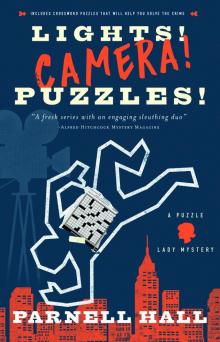 Lights! Camera! Puzzles!
Lights! Camera! Puzzles!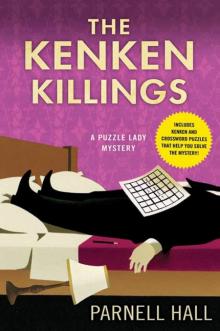 The KenKen Killings
The KenKen Killings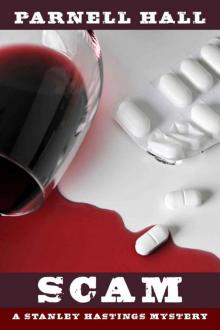 12-Scam
12-Scam The Puzzle Lady vs. the Sudoku Lady
The Puzzle Lady vs. the Sudoku Lady 2 Murder
2 Murder 7 Shot
7 Shot You Have the Right to Remain Puzzled
You Have the Right to Remain Puzzled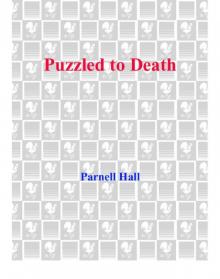 Puzzled to Death
Puzzled to Death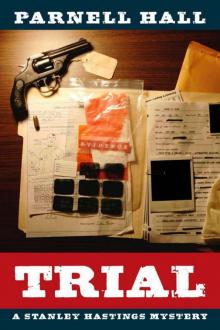 11-Trial
11-Trial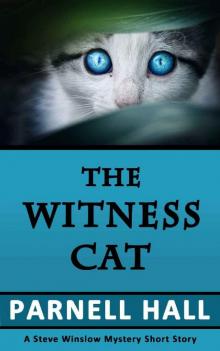 The Witness Cat (Steve Winslow Mystery)
The Witness Cat (Steve Winslow Mystery) With This Puzzle, I Thee Kill
With This Puzzle, I Thee Kill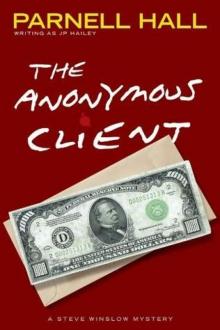 The Anonymous Client sw-2
The Anonymous Client sw-2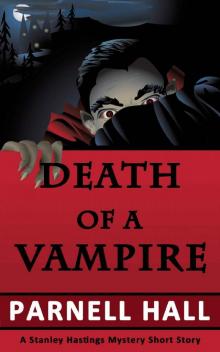 Death of a Vampire (Stanley Hastings Mystery, A Short Story)
Death of a Vampire (Stanley Hastings Mystery, A Short Story) The Wrong Gun sw-5
The Wrong Gun sw-5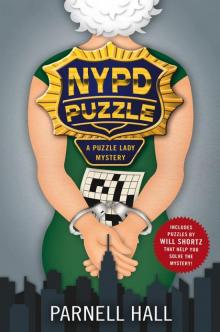 NYPD Puzzle
NYPD Puzzle 6 Juror
6 Juror 07-Shot
07-Shot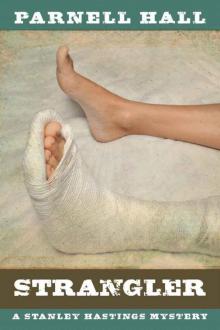 04-Strangler
04-Strangler 02-Murder
02-Murder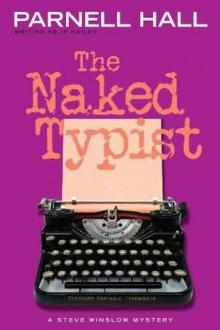 SW04 - The Naked Typist
SW04 - The Naked Typist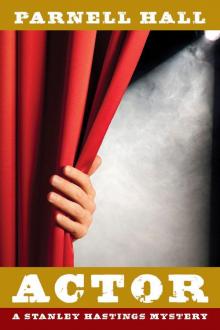 Actor
Actor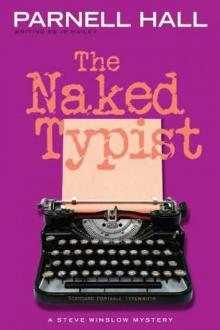 The Naked Typist sw-4
The Naked Typist sw-4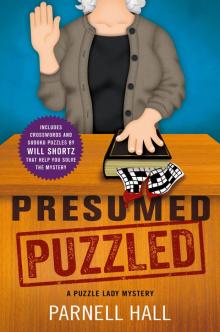 Presumed Puzzled
Presumed Puzzled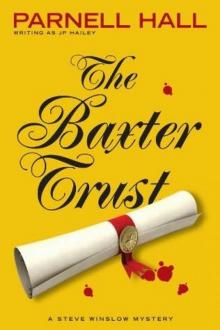 SW01 - The Baxter Trust
SW01 - The Baxter Trust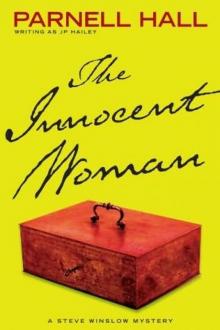 SW06 - The Innocent Woman
SW06 - The Innocent Woman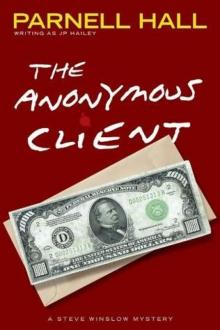 SW02 - The Anonymous Client
SW02 - The Anonymous Client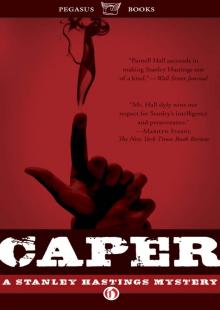 Caper
Caper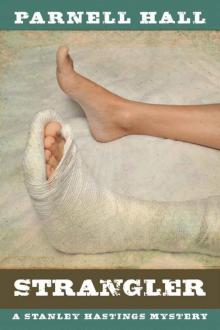 4 Strangler
4 Strangler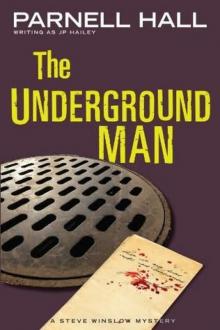 The Underground Man sw-3
The Underground Man sw-3 Manslaughter (Stanley Hastings Mystery, #15)
Manslaughter (Stanley Hastings Mystery, #15)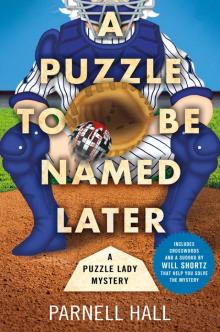 A Puzzle to Be Named Later--A Puzzle Lady Mystery
A Puzzle to Be Named Later--A Puzzle Lady Mystery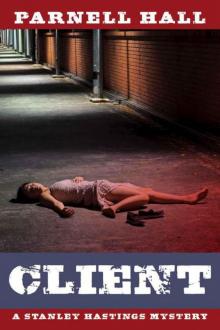 05-Client
05-Client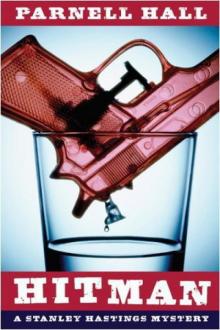 16 Hitman
16 Hitman SW05 - The Wrong Gun
SW05 - The Wrong Gun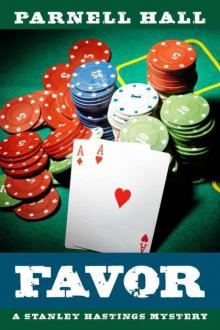 3 Favor
3 Favor Last Puzzle & Testament
Last Puzzle & Testament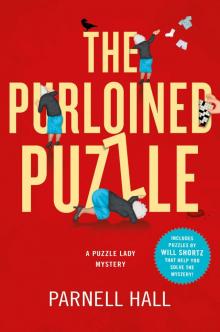 The Purloined Puzzle
The Purloined Puzzle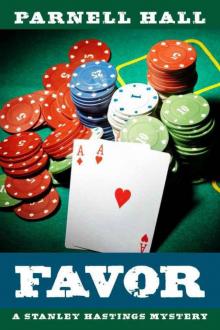 03-Favor
03-Favor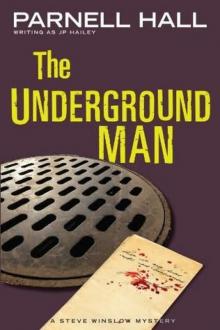 SW03 -The Underground Man
SW03 -The Underground Man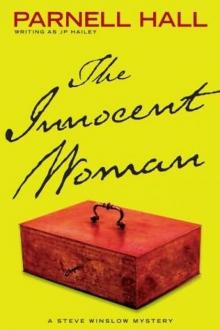 The Innocent Woman sw-6
The Innocent Woman sw-6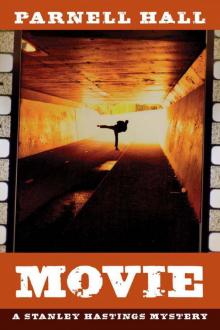 10 Movie
10 Movie 06-Juror
06-Juror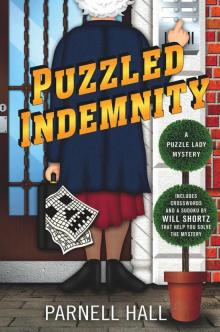 Puzzled Indemnity
Puzzled Indemnity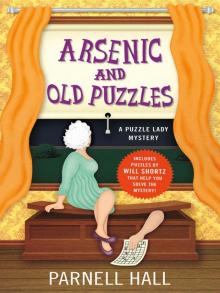 Arsenic and Old Puzzles
Arsenic and Old Puzzles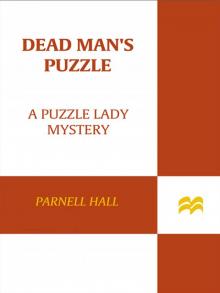 Dead Man's Puzzle
Dead Man's Puzzle Safari
Safari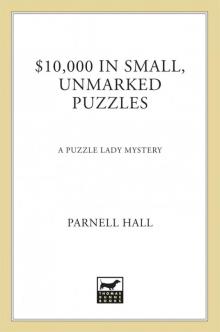 $10,000 in Small, Unmarked Puzzles
$10,000 in Small, Unmarked Puzzles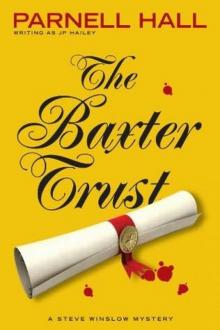 The Baxter Trust sw-1
The Baxter Trust sw-1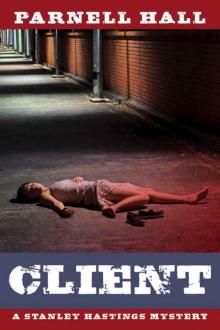 5 Client
5 Client Cozy (Stanley Hastings Mystery, #14)
Cozy (Stanley Hastings Mystery, #14)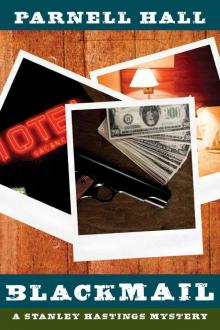 Blackmail
Blackmail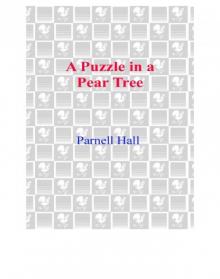 A Puzzle in a Pear Tree
A Puzzle in a Pear Tree A Clue for the Puzzle Lady
A Clue for the Puzzle Lady Clicker Training (Stanley Hastings Mystery, A Short Story)
Clicker Training (Stanley Hastings Mystery, A Short Story)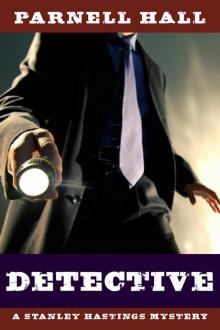 Detective (Stanley Hastings Mystery Book 1)
Detective (Stanley Hastings Mystery Book 1) 13 Suspense
13 Suspense